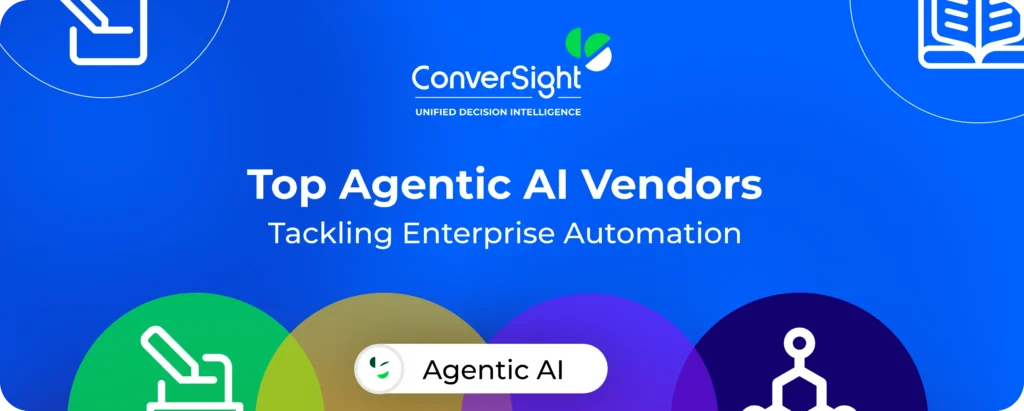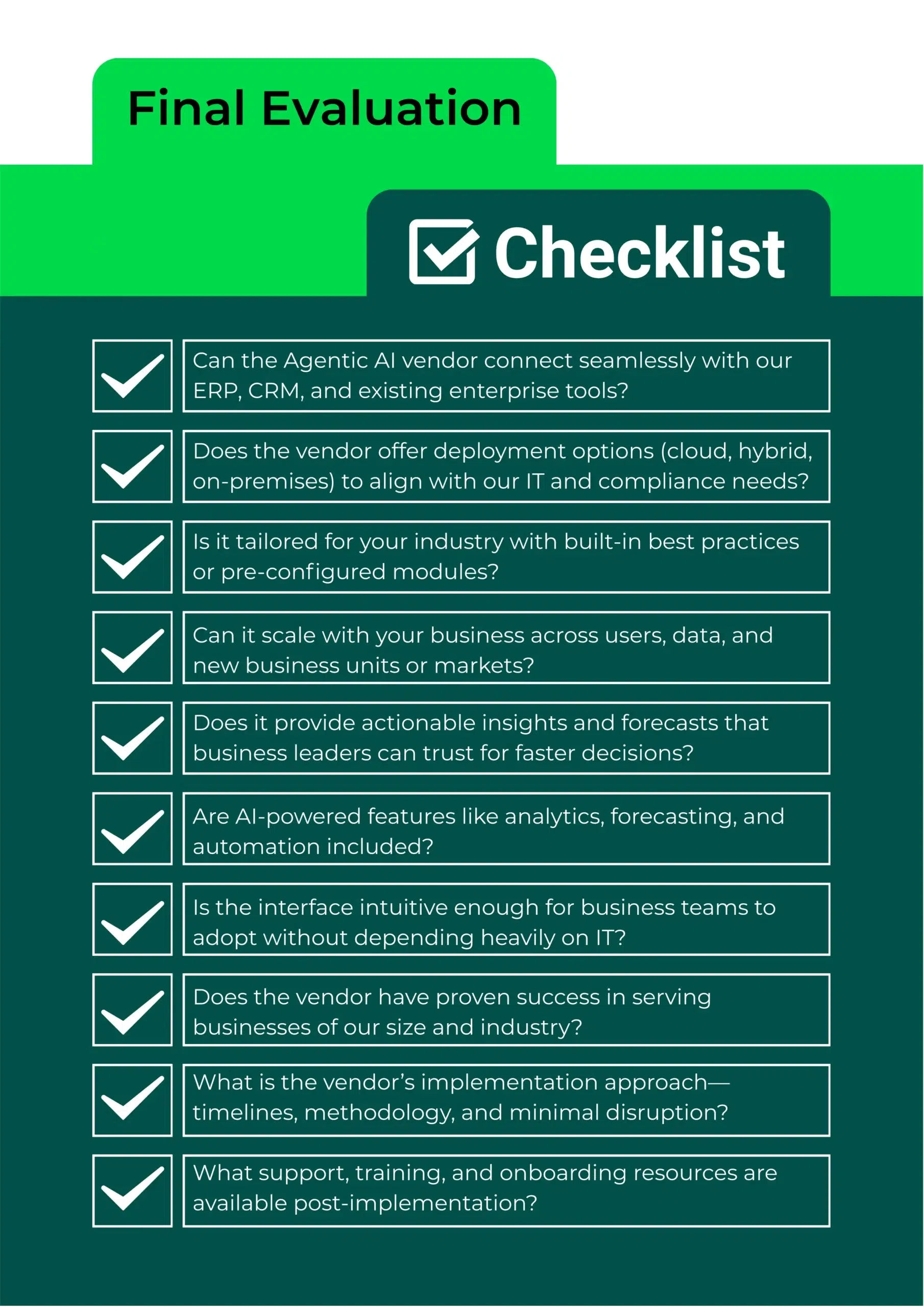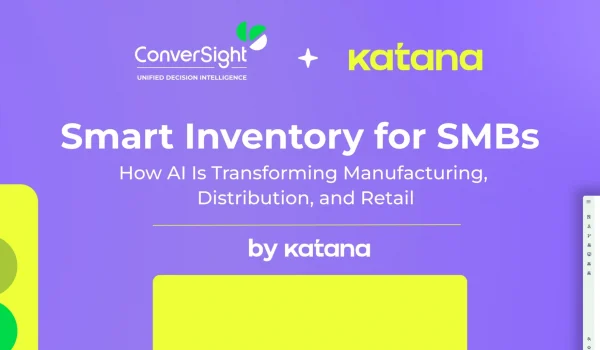From automation to autonomy — the evolution of enterprise intelligence
The Rise of Agentic AI in Enterprise Automation
In today’s rapidly evolving business environment, enterprises face mounting pressure to operate faster, smarter, and more efficiently. Traditional automation solutions have served their purpose, streamlining repetitive tasks and enforcing standardized workflows. However, as business operations become increasingly complex, static automation alone is no longer sufficient. Companies require systems that can act autonomously, make intelligent decisions, and adapt in real time to changing conditions.
This is where Agentic AI comes into play. At its core, Agentic AI represents a new generation of artificial intelligence designed to operate as autonomous agents. These agents are capable of perceiving their environment, reasoning about multiple variables, making decisions, and taking action independently. Unlike conventional rule-based automation or RPA, Agentic AI learns from experience, adapts to unforeseen scenarios, and can coordinate multiple tasks across departments without constant human intervention.
Agentic AI empowers organizations to move from reactive workflows to proactive, self-directed systems. Consider a supply chain disruption: a traditional system might flag the issue and notify a manager. An Agentic AI agent, by contrast, can evaluate the impact, re-prioritize production schedules, communicate with relevant stakeholders, and initiate corrective actions—all autonomously. This level of intelligence reduces operational delays, enhances resilience, and enables decision-makers to focus on strategic initiatives.
The benefits of adopting Agentic AI are substantial:
- Automation at Scale: Orchestrate complex, multi-departmental workflows without manual oversight.
- Real-Time Insights: Agents provide predictive analytics and recommendations in real time.
- Agility: Enterprises respond rapidly to market disruptions or operational challenges.
- Efficiency: Reduce manual intervention and improve process accuracy.
- Resilience: Systems self-correct and adapt to anomalies automatically.
By integrating Agentic AI into their operations, enterprises gain not just faster workflows but smarter, more resilient, and adaptive business processes—laying the foundation for sustainable growth in a competitive market.
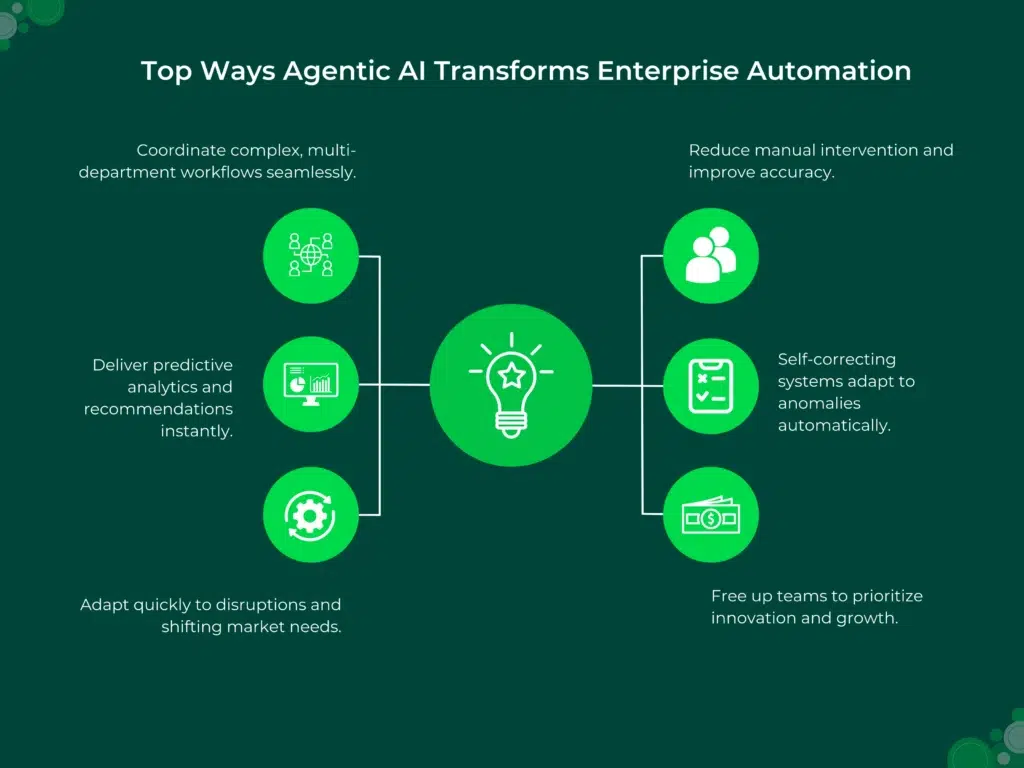
What Makes an Agentic AI Vendor “The Best”?
Choosing the right Agentic AI Vendor in 2025 is about more than adopting the latest AI technology—it’s about selecting a partner that can genuinely transform how your enterprise operates. The best vendors deliver autonomous intelligence that aligns with your strategic goals, integrates smoothly across ERP, CRM, and analytics systems, and provides actionable insights that empower teams to make faster, smarter decisions. They balance advanced automation with adaptability, ensuring workflows remain resilient and responsive to unexpected challenges. Ultimately, a top-tier Agentic AI Vendor helps your organization move from reactive processes to proactive, intelligence-driven operations.
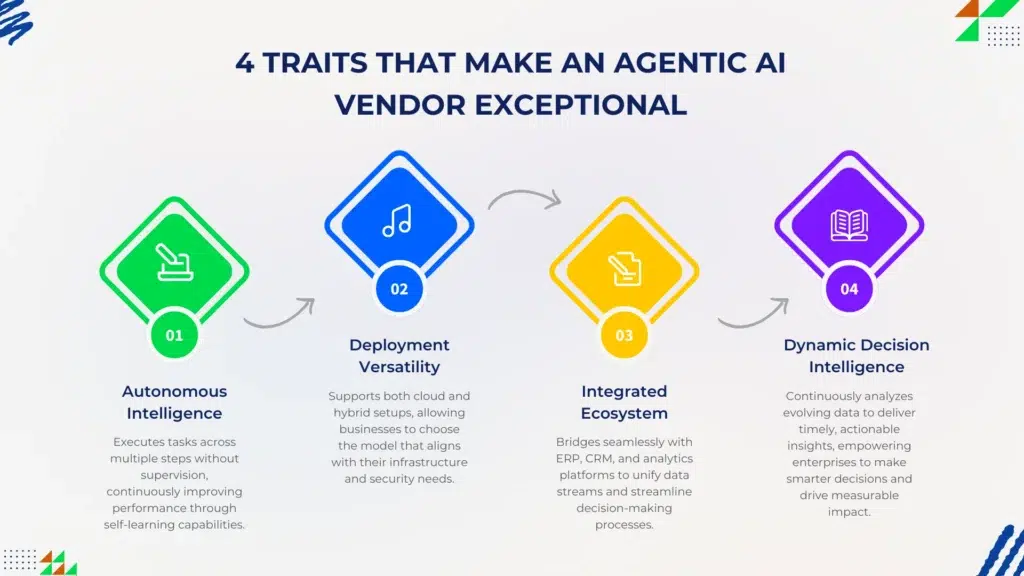
Agentic AI Platforms
Agentic AI platforms form the backbone of autonomous enterprise operations. They integrate intelligent agents that can perceive data, reason through complex scenarios, and act independently to achieve defined business outcomes. As enterprises face growing operational complexity, these platforms enable systems to make context-aware decisions and adapt in real time—beyond the limits of static automation. Selecting the right Agentic AI platform is crucial, as it determines how effectively an organization can scale intelligence across workflows, ensure seamless system integration, and maintain agility in a rapidly changing business landscape.
AI Agent Platform Types
Agentic AI platforms differ in focus and functionality, depending on how they process information, interact with users, and drive outcomes. Understanding these key platform types helps enterprises identify the solutions that best match their automation priorities and digital maturity.
1. Workflow-Oriented Agent Platforms
These platforms are designed to automate and coordinate complex business workflows across multiple systems. They emphasize orchestration between agents to manage interconnected processes efficiently, enabling large-scale automation with minimal manual oversight.
2. Decision Intelligence Platforms
These focus on transforming enterprise data into actionable insights. Through predictive analytics and adaptive reasoning, they support proactive decision-making and help organizations respond to operational shifts in real time.
3. Conversational and Cognitive Agent Platforms
Combining natural language understanding with autonomous reasoning, these platforms allow users to interact with enterprise systems through intuitive, conversational interfaces. They make data insights accessible, supporting collaboration and informed decisions across teams.
4. Explainable and Ethical AI Platforms
These platforms prioritize transparency, compliance, and safety in automated decision-making. By embedding explainability and governance mechanisms, they ensure that autonomous operations remain accountable and aligned with enterprise standards.
Meet the Top Agentic AI Vendors of 2025
As enterprises increasingly embrace autonomous, intelligent workflows, the market for agentic AI solutions has grown rapidly. By 2025, several vendors have emerged as leaders, each offering unique approaches to enable self-directed automation, decision intelligence, and multi-agent orchestration. Choosing the right vendor depends on organizational size, industry, IT ecosystem, and strategic automation goals. Below is a detailed overview of the top Agentic AI vendors shaping enterprise automation today.
Microsoft
Overview: Microsoft provides enterprise-grade agentic AI seamlessly integrated across Azure, Microsoft 365, and Dynamics. The platform enables multi-agent orchestration and leverages existing Microsoft tools to automate complex workflows across departments. Its recent announcement on agentic AI tools at Build 2025 showcases how Microsoft is evolving toward enterprise-scale autonomous operations. Its cloud and hybrid deployment flexibility make it suitable for large-scale enterprise operations.
Best For: Enterprises already deeply invested in the Microsoft ecosystem, including organizations using Azure, Dynamics 365, and Microsoft 365 tools extensively.
Integration Capabilities: Deep integration with Microsoft ecosystem products (Teams, Power Platform, Dynamics 365) allows enterprises to connect multiple workflows and share data across applications efficiently.
Deployment Options: Flexible deployment including cloud, hybrid, and on-premise options to meet diverse enterprise IT strategies and compliance requirements.
Strengths:
- Robust multi-agent orchestration for coordinating multiple workflows simultaneously.
- Native integrations across Microsoft products for seamless automation.
- Enterprise-level security, governance, and scalability for global operations.
Limitations:
- High licensing costs may be a barrier for mid-market enterprises.
- Complexity can pose challenges for organizations outside the Microsoft ecosystem.
Business Fit: Large organizations seeking enterprise-wide autonomous decision-making, particularly those looking to unify IT infrastructure and automate workflows without switching platforms.
OpenAI
Overview: OpenAI’s agentic AI platform is powered by GPT models, offering sophisticated reasoning, natural language understanding, and autonomous workflow capabilities. It supports multi-agent coordination, enabling complex tasks to be executed with minimal human intervention.
Best For: Enterprises requiring flexible AI agents capable of adaptive decision-making and advanced natural language reasoning, ideal for innovative and tech-forward organizations.
Integration Capabilities: Provides robust API support to connect with existing enterprise tools, enabling data-driven workflows across multiple platforms.
Deployment Options: Primarily cloud-based deployment, ensuring easy scalability and continuous updates.
Strengths:
- Powerful reasoning and problem-solving capabilities.
- Autonomous task execution across dynamic workflows.
- Rapid innovation with ongoing model improvements and updates.
Limitations:
- Implementation requires strong technical expertise.
- Enterprise-level support and integration maturity are still evolving.
Business Fit: Tech-forward organizations seeking adaptive AI agents that can enhance innovation, automate complex decisions, and support cross-functional collaboration.
IBM (Watsonx / Watson Orchestrate)
Overview: IBM’s Watsonx and Watson Orchestrate platforms deliver enterprise-grade cognitive AI with strong governance, security, and orchestration features. Recognized as a Luminary in Everest Group’s Innovation Watch: Agentic AI Products 2025, IBM demonstrates leadership in secure, compliant agentic AI orchestration. These solutions are especially valuable in regulated industries requiring auditable workflows.
Best For: Enterprises in regulated sectors such as healthcare, finance, and government that demand compliance, security, and transparency in autonomous operations.
Integration Capabilities: Supports integration with enterprise applications, including ERP, CRM, and analytics platforms, allowing AI agents to access and act on reliable data across departments.
Deployment Options: Offers cloud, hybrid, and on-premises deployment models to accommodate industry-specific compliance and IT requirements.
Strengths:
- Governance and auditability for enterprise compliance.
- Enterprise workflow integration and multi-agent orchestration.
- Secure, reliable, and scalable AI infrastructure.
Limitations:
- Deployment can be complex and resource-intensive.
- Higher cost may limit accessibility for smaller organizations.
Business Fit: Large, regulated enterprises that require secure, auditable agentic AI for mission-critical workflows and compliance-heavy operations.
Oracle
Overview: Oracle integrates agentic AI into its Cloud applications, including ERP, HCM, and SCM, to deliver end-to-end automation and predictive analytics. Recognized as a Market Leader in AI Agents and Conversational AI by ISG Research, strengthening its position in enterprise-grade agentic AI solutions.
Best For: Enterprises managing multiple subsidiaries or divisions requiring unified, centralized automation.
Integration Capabilities: Strong integration with Oracle ERP, HCM, SCM, and other enterprise applications for centralized visibility and coordination.
Deployment Options: Primarily cloud-based, with hybrid options for organizations requiring partial on-premise deployments.
Strengths:
- End-to-end automation across finance, HR, supply chain, and operations.
- Deep predictive analytics for proactive decision-making.
- Seamless integration within the Oracle Cloud ecosystem.
Limitations:
- Learning curve for teams unfamiliar with Oracle systems.
- Higher cost for mid-market enterprises may be a consideration.
Business Fit: Mid-to-large enterprises with complex operations seeking centralized control and predictive insights across multiple business units.
Anthropic
Overview: Anthropic focuses on safe and explainable AI through its Claude agents. Designed for reasoning-intensive workflows, it emphasizes transparency, interpretability, and ethical AI practices while supporting knowledge-intensive enterprise processes.
Best For: Organizations that require explainable AI for critical decision-making, particularly where accountability and safety are paramount.
Integration Capabilities: APIs allow integration with key enterprise systems such as ERP, CRM, and analytics platforms, enabling secure, explainable decision-making across workflows.
Deployment Options: Cloud-based deployment with capabilities to support hybrid environments for enterprises needing flexible operational setups.
Strengths:
- Provides clear, explainable decisions that can be audited.
- Supports complex, knowledge-intensive workflows.
- Flexible API integrations for connecting with enterprise systems.
Limitations:
- Enterprise-scale support is less extensive than Microsoft or IBM.
- Requires technical integration effort to deploy effectively.
Business Fit: Enterprises prioritizing safe, interpretable AI in high-stakes operations, such as finance, healthcare, or regulatory environments.
ConverSight
Overview: ConverSight offers a Unified Decision Intelligence platform that embeds agentic AI directly into enterprise decision-making. Its AI agent, Athena, was recognized as the 2025 AI Agent Product of the Year for its autonomous decision orchestration across supply chain, finance, and operations. The platform’s strong foundation in supply chain decision intelligence enhances end-to-end visibility and responsiveness, making it particularly effective for enterprises managing complex, multi-tier operations. Learn more about how ConverSight advances supply chain decision intelligence
Best For: Businesses seeking autonomous insights in ERP, BI, finance, supply chain, operations, or sales, without requiring extensive technical resources.
Integration Capabilities: Supports seamless connections with ERP, CRM, BI, and analytics systems, allowing Athena to orchestrate insights and decisions across multiple enterprise functions.
Deployment Options: Cloud-based deployment with minimal IT setup; accessible via web interface and APIs, enabling flexible adoption across departments without on-premises infrastructure.
Strengths:
- Athena delivers proactive, decision-support capabilities.
- Conversational interface allows intuitive interaction with data.
- Multi-agent orchestration ensures insights are coordinated across teams.
- Seamless ERP and CRM integration for actionable insights.
Business Fit: Enterprises aiming to transform raw data into real-time decisions, enhance ERP/BI intelligence, and accelerate actionable outcomes across teams.
Meet Athena! ConverSight’s Agentic AI assistant transforming enterprise decision-making.
How to Choose the Right Agentic AI Vendor
Don’t just automate—choose an Agentic AI Vendor that drives enterprise intelligence.
Selecting the right Agentic AI Vendor is critical for achieving meaningful enterprise automation. With so many vendors offering advanced capabilities, the choice isn’t just about features—it’s about how well the platform aligns with your organization’s goals, workflows, and technology ecosystem. The right vendor will enable autonomous workflows, deliver actionable insights, and scale with your enterprise over time.
Evaluating Agentic AI Vendors requires a structured approach. Below are the key factors to consider:
Autonomy & Intelligence
Assess how independently the AI agents can operate and reason across dynamic workflows. Look for capabilities such as multi-step task execution, self-directed problem solving, and adaptive learning from historical data. Vendors whose agents can proactively handle exceptions, reprioritize tasks, or escalate issues reduce the need for constant human intervention.
Integration & Ecosystem Fit
Ensure the AI platform integrates seamlessly with existing systems like ERP, CRM, supply chain, and analytics tools. The vendor should support both cloud and on-premises deployments, provide robust APIs, and offer connectors for key enterprise applications. Strong integration ensures that data flows smoothly across functions, enabling AI agents to act on reliable, real-time information.
Decision Intelligence & Insights
Look for platforms that go beyond task automation to deliver predictive analytics, proactive recommendations, and actionable insights. Effective Agentic AI vendors provide visibility into business operations, helping decision-makers act faster and with greater confidence. Evaluate the quality, relevance, and timeliness of the insights the platform can generate.
Security, Compliance & Governance
Prioritize vendors that embed security, governance, and compliance into their AI workflows. This includes audit trails, access controls, regulatory compliance features, and explainable AI capabilities. In regulated industries, these features are non-negotiable for safe, accountable operations.
Usability & Adoption
A successful Agentic AI implementation requires adoption across teams. Look for intuitive interfaces, role-based dashboards, conversational AI, and minimal learning curves. Platforms should empower business users, not burden IT teams with complex maintenance or repeated training sessions.
Vendor Track Record & Support
Review vendor experience in enterprise deployments, success stories, and customer references. Consider the quality of technical support, training, and professional services. A vendor with a proven track record and responsive support ensures smoother deployment, fewer disruptions, and higher ROI.
While both are transformative, their roles, strengths, and limitations are distinct. Framing them together reveals why enterprises need to adopt them in tandem.
Discover how the Conversight Agentic AI Platform empowers smarter decisions → Click Here!
Conclusion
Choosing the right Agentic AI Vendor is more than selecting a software platform—it’s about selecting a strategic partner that can transform your enterprise operations. The right vendor enables autonomy, drives actionable insights, and ensures that complex workflows across finance, supply chain, operations, and sales run seamlessly.
By carefully evaluating vendors based on autonomy, integration, decision intelligence, security, usability, and track record, enterprises can ensure that their investment in Agentic AI delivers real, measurable impact. The ideal platform doesn’t just automate tasks; it empowers organizations to anticipate challenges, respond proactively, and make smarter, faster decisions across all levels of the business.
As the enterprise landscape becomes increasingly dynamic, adopting a capable and intelligent Agentic AI Vendor positions organizations for resilience, efficiency, and growth. The future of enterprise automation lies in agents that act autonomously, learn continuously, and support decision-makers with timely, actionable insights. Choosing the right partner today lays the foundation for a smarter, more adaptive, and competitive enterprise tomorrow.
Ready to see Agentic AI in action?
Schedule a live ConverSight demo and discover how our platform empowers teams to make smarter, faster, and more autonomous decisions with real-time insights.
